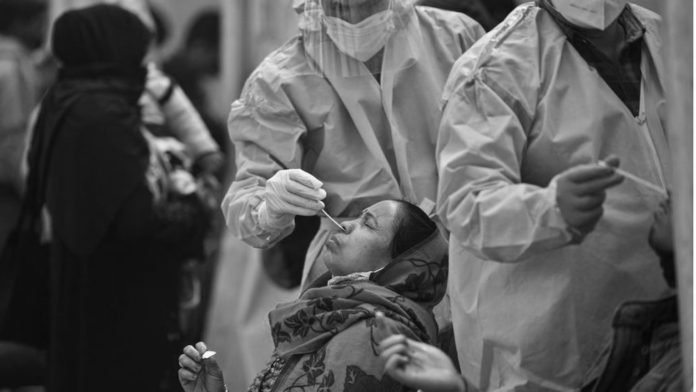6,358 people testing positive for coronavirus infections in a day, India’s total tally of COVID-19 cases rose to 3,47,99,691. The active cases have declined to 75,456, according to the data updated at 8 am. The death toll has climbed to 4,80,290 with 293 fresh fatalities, the data stated.
The daily rise in new coronavirus infections has been recorded below 15,000 for the last 61 days now.
The active cases have declined to 75,456 comprising 0.22 per cent of the total infections, the lowest since March 2020, while the national COVID-19 recovery rate was recorded at 98.40 per cent, the highest since March 2020, the ministry said.
India has logged 653 cases of the Omicron variant of coronavirus across 21 states and UTs so far out of which 186 have recovered or migrated, according to the Union Health Ministry data updated on Tuesday. Maharashtra recorded the maximum number of 167 cases followed by Delhi at 165, Kerala 57, Telangana 55, Gujarat 49 and Rajasthan 46.
India’s COVID-19 tally had crossed the 20-lakh mark on August 7, 2020, 30 lakh on August 23, 40 lakh on September 5 and 50 lakh on September 16. It went past 60 lakh on September 28, 70 lakh on October 11, crossed 80 lakh on October 29, 90 lakh on November 20 and surpassed the one-crore mark on December 19.
TMC MP Derek O’Brien has tested positive for Covid-19. Taking to Twitter, he said he had moderate symptoms and was under isolation at home.
BCCI chief Sourav Ganguly has tested positive for Covid-19. His report came last night. His sample is being sent for genome sequencing to ascertain the presence of the Omicron variant.
More about Omicron
The Omicron variant has been called a variant of concern by WHO based on studies that shows it has several mutations.
Still a lot of research is underway to evaluate its transmissibility, severity and reinfection risk.
The Omicron variant has been detected in several regions of the world. WHO reports that the likelihood of the Omicron variant spreading further globally is high.
It is not currently known if the Omicron variant is more or less severe than other strains of COVID-19, including Delta. Studies are ongoing and this information will be updated as it becomes available.
It is not yet clear whether Omicron can spread more easily from person to person compared to other variants, such as Delta.
However, being vaccinated and taking precautions such as avoiding crowded spaces, keeping your distance from others and wearing a mask are critical in helping to prevent the spread of COVID-19, and we know these actions have been effective against other variants.
Researchers are looking into any potential impact the Omicron variant has on the effectiveness of COVID-19 vaccines. Although information is still limited, WHO believes it is a reasonable assumption that the currently available vaccines offer some protection against severe disease and death.
It is also important to be vaccinated to protect against the other widely circulating variants, such as the Delta one. When it’s your turn, make sure to get vaccinated. If your vaccination involves two doses, it’s important to receive both in order to have the maximum protection.
According to WHO, early evidence suggests that people who have previously had COVID-19 could be reinfected more easily with Omicron, in comparison to other variants of concern. Information is still limited though and we will share updates as it becomes available.
Source: UNICEFRead more Health News
Latest update Omicron

